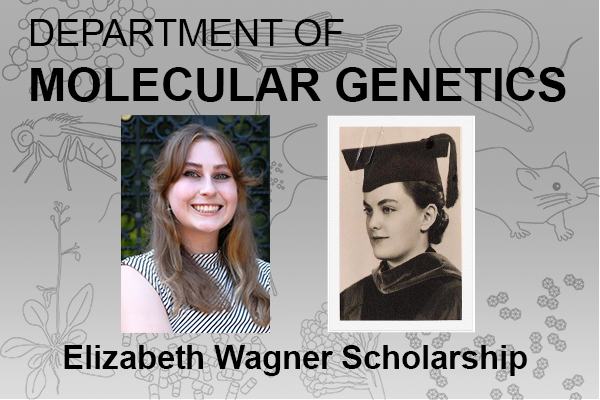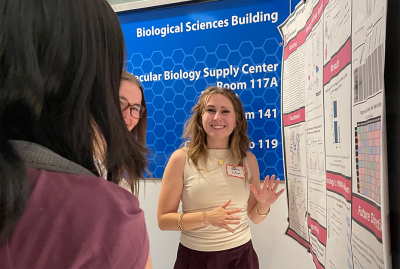2024 Elizabeth Wagner Scholarship

The Department is delighted to recognize the 2024 awardee of the The Elizabeth Wagner Scholarship.
Sophie Cihan earned the award to complete research in the lab of Dr. Anita Hopper. Her research project focuses on exportin preferences found within tRNA primary nuclear export in S. cerevisiae, particularly the interactions between primary nuclear exportins and intron-containing tRNA families. Sophie has presented her work in several venues, including our 2024 open house
We asked Sophie a few questions about her experiences at OSU

Why did you pick Molecular Genetics at OSU?
I initially applied to OSU as a pre-nursing major, but before starting my freshman year I decided to look at other options that might better suit my passions. I’ve always enjoyed learning about the life sciences; Molecular Genetics piqued my interest with their applications into such diverse fields!
What excites you most about being involved in research?
I love that research is never a linear process! You constantly face challenges or obstacles when trying to answer your queries. Sometimes your experiments grant insights you did not expect to find going in, and you are left with even more questions than you came in with. The process of uncovering the unexpected is truly rewarding for me!
What else would you highlight about your experiences at OSU?
OSU never lacks in opportunity or people to meet. Both OSU and Columbus are such lively environments; there are so many ways you can grow your passions here!
This award was funded by the The Elizabeth Wagner Scholarship fund.
Elizabeth Wagner was born in 1912. She earned her bachelor’s degree at OSU in 1933, putting herself through school with a scholarship and a job washing dishes in the cafeteria. She then earned a master’s (1934) and a Ph.D. (1936) in plant physiology, publishing works on the effects of insecticides and inert dusts on bean plants and on yellow coleus. She went on to marry geneticist Sheldon C. Reed, and together they were pioneers for the use of Drosophila in population genetics studies, as well as becoming early proponents of genetic counseling.
Dr. Wagner Reed also published works investigating the effects of sexism on women scientists including a study on the productivity and work of 70 female scientists, and a book entitled American Women in Science Before the Civil War. This work informed her mentorship of younger women through the group Graduate Women in Science.
The Elizabeth Wagner Scholarship fund was endowed in 2002 by her son William Reed of Seattle. Consider supporting the fund here.
